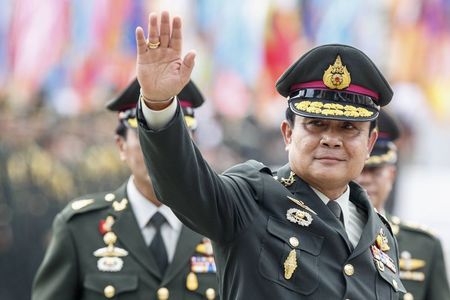By Amy Sawitta Lefevre
BANGKOK (Reuters) - Sixteen years old and studying 13 hours a day, high school pupil Worapot doesn't have time to waste matching up to a military-led government's idea of what makes a good Thai.
The generals who led a coup in May have prioritised school reforms to inculcate a strong sense of national identity - or Thai-ness - in a country whose traditional values hinge on unquestioning respect for the monarchy, religion and elders.
For Worapot, the son of junior civil servants who together earn $1,800 (1,124.5 pounds) a month, a more practical goal would be creating an education system that commands respect in the job market.
"Now the system might get even worse," said Worapot, as he sat on the steps of a language school in a bustling Bangkok shopping district where he is taking extra lessons in English.
Still to lift martial law, the junta has given education the biggest slice of the 2015 budget, raising teachers' pay and redrawing the national curriculum with the aim to introduce it at the start of the next school year in May.
Aside from giving Thai history and culture more emphasis, classes in "moral soundness and virtues" will be introduced.
Worapot's frustration with the new policies is magnified by the prospect that the job market will become tougher once a trade pact, due to start next year, brings together 600 million people in Southeast Asia.
He wants to be able to compete with better-off Singaporeans and Malaysians rather than be patronised for quaint moral codes or nationalist sentiments.
"I want to be their equal or better. Not to be ridiculed," he said, while using a Thai-to-English application on his iPad.
ADMIRAL PLOTS COURSE
For years, education in Thailand has been handicapped by a reliance on rote-learning and stress on skills that support basic jobs but just do not cut it for a booming middle class that aspires to better jobs and better pay.
Technocrats have long called for changes to put more stress on developing critical thinking skills rather than conformity, whereas Thais often shy away from showing individuality for fear of "losing face", or causing embarrassment.
The reforms envisaged by the junta - including civic duty and morality classes to promote "a sense of pride in being a Thai" - do not appear to be the answer.
"The way the government promotes certain values may not fit well with the development of 21st century skills," said May Sripatananskul, education initiative project manager at the Thailand Development and Research Institute (TDRI), a Bangkok-based independent think-tank.
Multinationals based in the kingdom already complain of a shortage of skilled and professional labour.
"Most graduates may not have basic skills adequate to the needs of the company - for example, practical command of the English language, communication, time management and behavioural skills," Krisda Utamote, director of corporate communications at BMW Group Thailand, told Reuters.
Thailand's education system is routinely ranked as one of the worst in Southeast Asia.
Attempts by previous governments to bring students up to speed with their Asian peers - from free, "Made in China" computer tablets for primary school children to foreign exchange programmes - have proved ineffective or disastrous.
In the UN Development Programme's 2014 human development index, Thailand ranks 89th out of 187 countries for education.
Taking over an economy laid low by months of political unrest and martial law, Prime Minister Prayuth Chan-ocha, the former army chief, has said he will do "everything" to ensure Thailand remains a hub for foreign investors.
The policymakers chosen to oversee the school reforms have raised some eyebrows, however.
Prayuth's education minister, Narong Pipathanasai, was chief of Thailand's navy until September. And Art-ong Jumsai Na Ayudhya, the aristocrat tasked by the Office of Basic Education Commission (OBEC) with re-drafting the curriculum, believes in UFOs and the paranormal powers of ancient Egyptian pyramids.
A petition calling for his removal has gathered over 3,000 signatures. Art-ong did not reply to a Reuters request for an interview, while OBEC said it was "under orders from the highest level not to comment on education policy."
GOING DOWNHILL
As a percentage of gross domestic product, Thailand already spends more on education than Germany, but that has not brought success.
TDRI's May bemoaned the amount wasted through inefficiency, and the failure of higher pay to translate to better quality teachers. The largest chunk of the budget is spent on the primary and pre-primary segments.
Yet, Thailand ranked 90th out of 144 countries for the quality of primary education, the latest World Economic Forum Global Competitiveness Report showed. Neighbouring Malaysia, whose per capita GDP is double Thailand's $5,779, ranked 17th.
Past studies by U.N. agencies have noted that while access to primary education is fairly equal across Thai society, more should be invested in secondary and tertiary levels, where both access and quality need improvement.
Better-off families avoid public schools if they can. The well-heeled, living in Bangkok, have the choice of sending their children to international schools where annual fees average 400,000 baht ($12,300), according to a 2013 survey.
"I can do without patriotism and morality classes," said businessman Krissada Pornweroj, while waiting for his son outside a British school in the capital.
"We want him to get in to a good English boarding school."
The negative economic implications of the country's weak classroom performance will be compounded by a shift in Thailand's demographics.
While most of Southeast Asia will enjoy relatively young populations decades from now, Thailand bucks the trend. It currently has a population of around 66 million people.
Once the working-age population starts to decline in 2020, according to U.N. estimates, economic growth could suffer.
"Thailand does run the risk of losing competitiveness," said Rahul Bajoria, an economist in Singapore at Barclays Plc.

"Historically, the Thai labour force has been more productive than Singapore, Malaysia and Indonesia but without sustained focus, that productivity gap can narrow." (1 US dollar = 32.4200 Thai baht)
(Editing by Simon Cameron-Moore)
